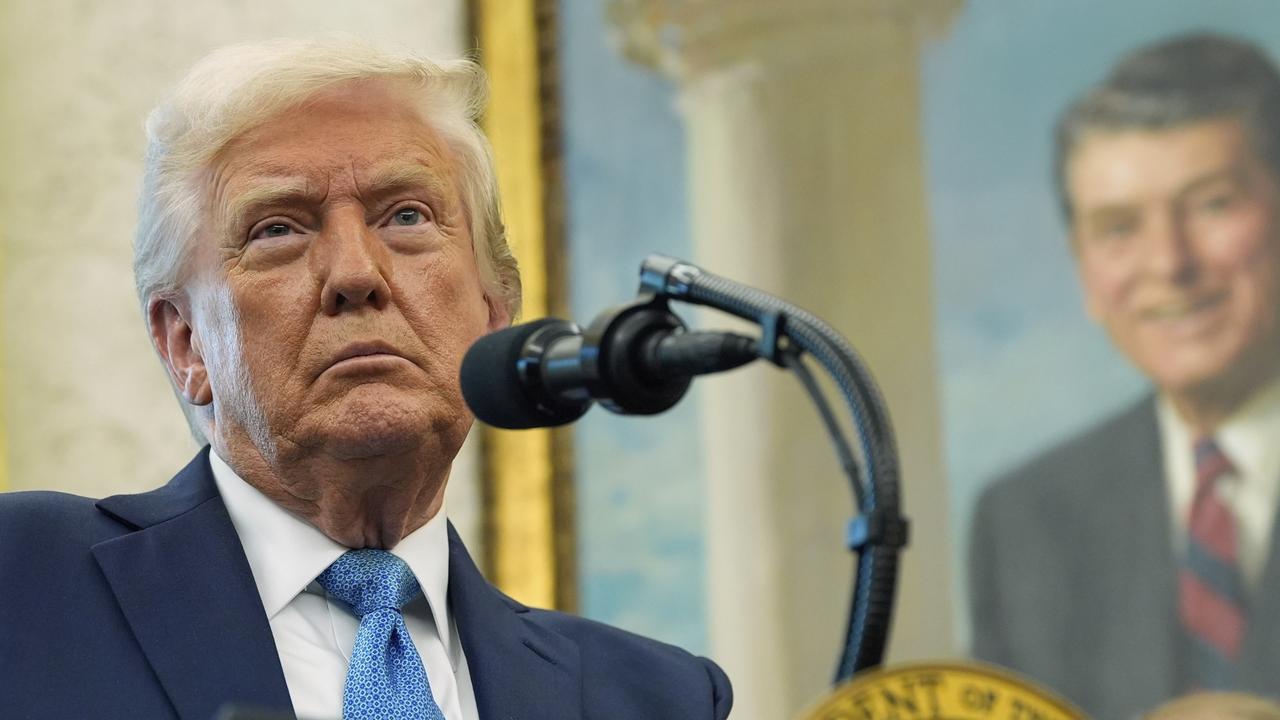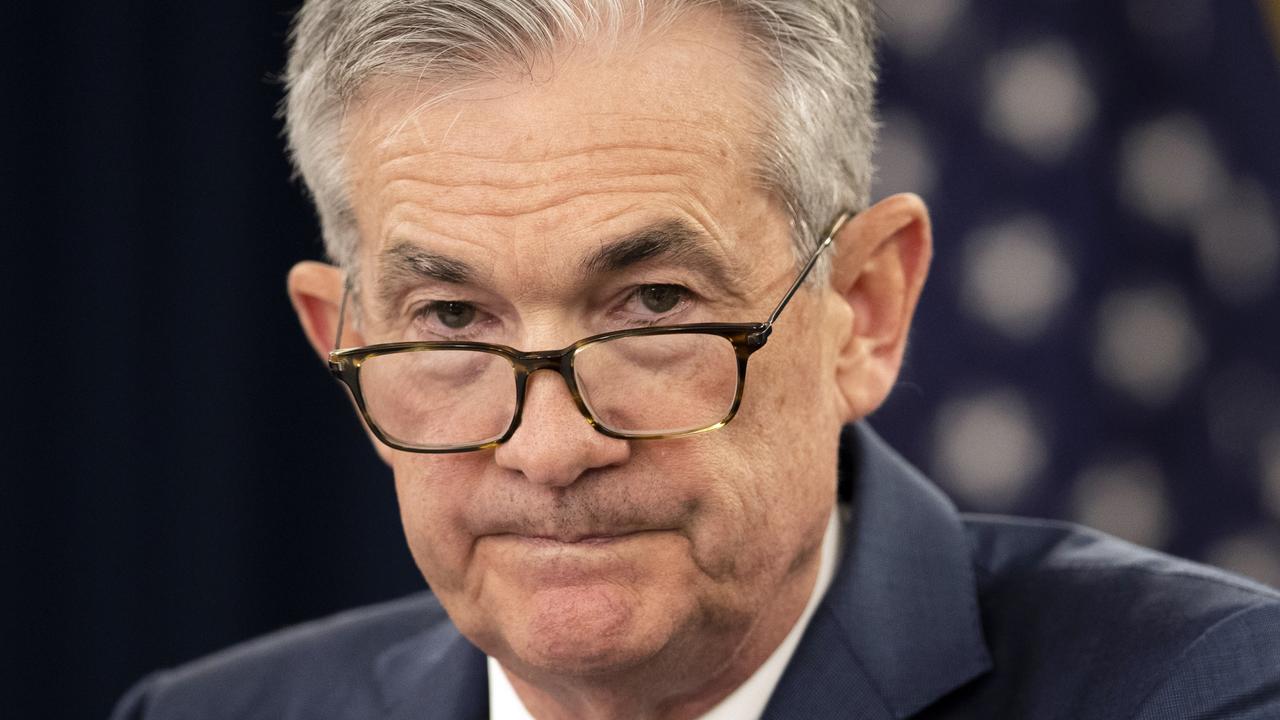‘Most expensive in world history’: CBA stuns
While the world writhes in economic turmoil not seen in years due to Donald Trump’s protectionist agenda, something unusual is happening here in Australia.
While the world writhes in economic turmoil not seen in years due to Donald Trump’s protectionist agenda, something unusual is happening here in Australia.
The world’s most powerful economy, the US, has seen the value of its top 500 companies fall by almost 10 per cent in the last six months.
President Trump’s sweeping global tariffs have caused investors to smash the panic button. Now a new row between the 78-year-old and the chairman of the US Federal Reserve has added fuel to the fire.
In a sign that the world is facing great uncertainty, the price of gold has surged to record highs while stock markets around the world — from Europe to Japan — have taken a battering.
Australia is fairing reasonably well, with the ASX only falling by 3.32 per cent in the past six months. But if you look closely, there is one company doing much of the heavy lifting.
The nation’s biggest company by market capitalisation — Commonwealth Bank — has seen something truly remarkable happen to its share price.
On Tuesday, it surged to an all-time high after rocketing 4.2 per cent in one day after a massive rise 49 per cent in the past 12 months. That, remarkably, makes it now the most expensive bank stock in the history of the world.
Even seasoned investors are stunned by what is happening.
“Everyone has been scrambling to explain the phenomenon,” the AFR’s Chanticleer reported. “One analyst reported 10 inbound calls on Tuesday from investors worried they had missed something. No one can rationally explain why any investor is ploughing capital into a bank with zero earnings growth and an eye-watering valuation.”

There are some theories floating around about what is causing investors from around the world to pour their cash into an Aussie bank amid fears of a global recession.
Richard Coppleson, the director of institutional sales and trading at Bell Potter, claimed in his Coppo Report newsletter that a very significant US institutional investor has been selling their US stocks and looking elsewhere.
They have been spooked by what’s happening in the US, so do want to plough their money into the stock market there because of the uncertainty created by President Trump.
China is also taking a hammering as it cops brutal 145 per cent tariffs on its exports to one of its biggest markets, the US. So that is also scaring investors away.
Mr Coppleson said these big investors have instead been looking for opportunities in Australia. The first place they tend to look is our banks and they don’t care how much they pay for them.
If they’re looking at our banks then it’s hard to look past Commonwealth which holds roughly a quarter of Australia’s $2.2 trillion mortgage market.
This is underpinned by a housing market that has famously risen so quickly over several decades that it has made tradies living in the suburbs into millionaires and prevented whole generations of Australians from ever owning their own homes, as wage increases have no chance to keep pace.
However, it’s not all plain sailing for Commonwealth — which is actually seeing its share of the lucrative borrowing market fall. For instance, in May 2023, CBA’s mortgage market share was about 25.9 per cent. ​
This reduction in market share is partly due to the bank’s strategic decision to focus on profit margins over aggressive expansion. It went as far as to deliberately reduce its home loan book by $2 billion, opting not to compete for less profitable mortgage customers.
On the flip side, with other major banks like ANZ and Westpac have gained market share by offering competitive rates and cashback incentives.
However, if you look at what happened on the ASX on Tuesday, it’s clear these mystery cashed-up investors only have eyes for one bank. Westpac rose just 0.1 per cent, while NAB and ANZ fell 0.5 per cent and 0.6 per cent respectively.

Australia’s other big banks may not be getting the same luxuries as Commonwealth for a number of reasons.
ANZ is undergoing big changes as it prepares for an imminent CEO change on May 12. ASIC has been investigating the bank for various concerns, including potential market manipulation during a $14 billion government bond sale in 2023, miscalculated interest on savings accounts, and potentially incorrect hardship provisions.
NAB has just seen its CFO, Nathan Goonan, poached by rival Westpac. And, Westpace, in turn, is in the midst of a massive IT transformation which is costing it $2 billion a year until 2028.
Macquarie Group — known as the “millionaire factory” because of how much dosh it makes — has seen its earnings decline in recent years.
For the fiscal year ending March 31, 2024, Macquarie reported a net profit after tax of $3.52 billion, marking a 32 per cent decrease compared to the previous year — marking the company’s most significant annual profit drop in 15 years.
Another reason CommBank may be doing so well is that size matters when it comes to investing, and the bigger you are the more you will get from so-called passive investing.
This means people may not be actively seeking out CommBank shares but they are buying them passively because they are now such a big part of major part of index funds like the ASX200 or superannuation funds.
Commonwealth Bank takes up a massive 11.5 per cent of the ASX200 — an index of Australia’s top 200 companies — the next biggest stock is BHP at 7.9 per cent, and the next biggest bank is Westpac at 4.5 per cent.
This means that for every $1000 someone invests in the ASX200, CommBank will get roughly $115 while is next biggest rival Westpac will get just $45.
Trump walks back major threat
There was more misery piled on global markets on Tuesday after President Trump engaged in a war of words with Federal Reserve Chair Jerome Powell.
Mr Powell is the head of the US’ central bank and he has expressed grave concerns about the economic impact of President Trump’s policies, especially the implementation of global tariffs.
He warned that these tariffs could lead to stagflation — a toxic mix of stagnant economic growth and high inflation — which makes the Fed’s mandate of maintaining stable prices and maximum employment difficult.
President Trump retaliated in an extraordinary tirade — calling Mr Powell a “major loser” for not cutting interest rates. This comes amid speculation the president will attempt to fire Mr Powell after threatening action last week.
Observers warned such a move would have dealt a blow to the Fed’s independence and sparked a crisis of confidence in the world’s top economy, sparking a sell-off of US assets and another global crisis.
However, President Trump said overnight he had “no intention” of firing the head of the Federal Reserve and that eye-watering tariffs on China would be slashed drastically.
“I have no intention of firing him,” he said. “I would like to see him be a little more active in terms of his idea to lower interest rates — it’s a perfect time to lower interest rates. If he doesn’t, is it the end? No.”
The remarks gave a much-needed shot of relief to investors, helped by the president’s comments later indicating a more conciliatory approach to the trade war with China.
Washington has imposed tariffs of 145 per cent on a range of products from China, while Beijing has replied with 125 per cent duties on imports from the United States.
But the president on Tuesday acknowledged that the US levies were at a “very high” level, and that this will “come down substantially”.

“They will not be anywhere near that number,” he said, but added that “it won’t be zero”.
That came after Treasury Secretary Scott Bessent told a closed-door event in Washington that he expected a de-escalation soon in the United States’ tariff standoff with China, which he said was not sustainable.
White House Press Secretary Karoline Leavitt later said “the president and the administration are setting the stage for a deal”, noting that “the ball is moving in the right direction”.
Investors welcomed the comments with open arms, pushing Tokyo, Hong Kong, Sydney, Seoul and Wellington more than one per cent higher, while Taipei rallied more than three per cent.
The gains followed rallies of more than two per cent for all three main indexes in New York.
More Coverage
“While it is still early days, the mood in the market is evidently shifting and what was a strong ‘sell America’ vibe flowing through markets … has in part reversed,” said Chris Weston at Pepperstone.
He added that the president’s comments on Powell “should go some way to allaying fears of a major policy mistake”.
Investors were unmoved by the International Monetary Fund’s decision to slash its global economic growth outlook by 0.5 percentage points to 2.8 per cent this year, citing the effect of President Trump’s tariff policies.






